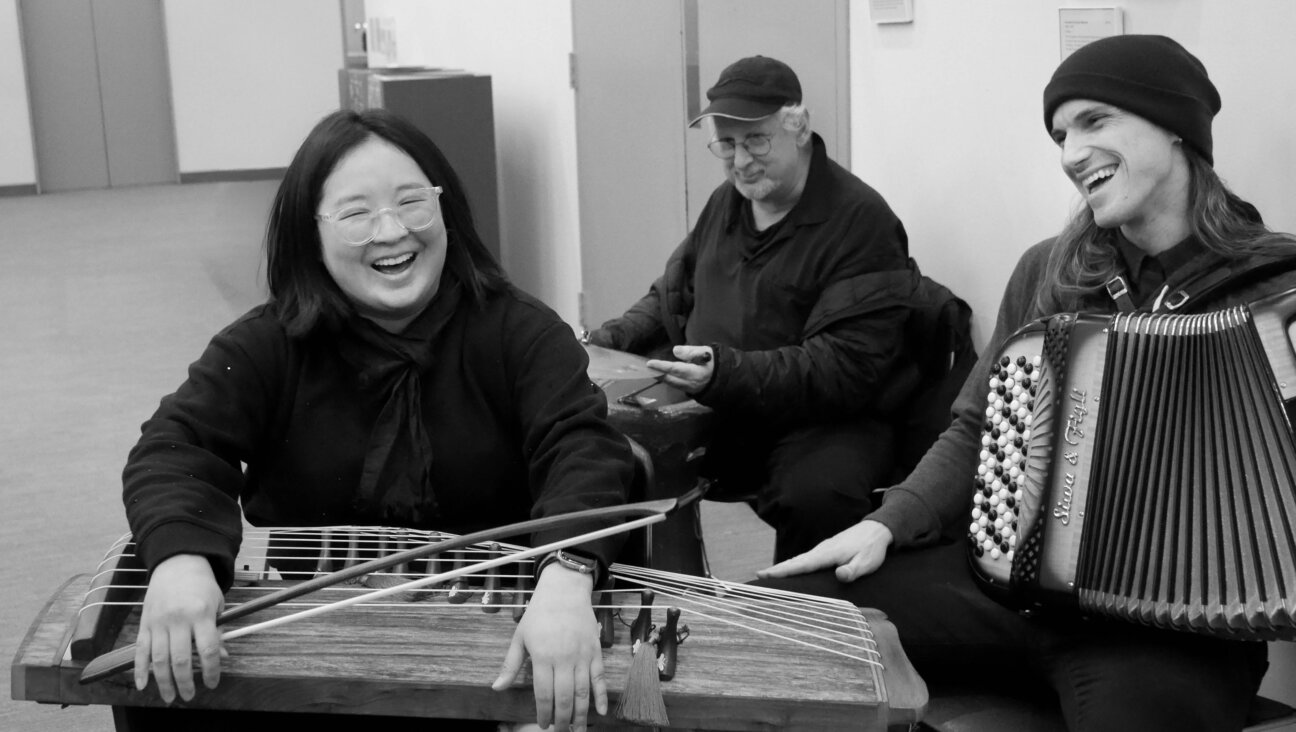Will Jewish Camp Turn My Sons Into Members of Tribe?

Image by Lily Padula
The Seesaw is a new kind of advice column in which a a broad range of columnists will address the real life issues faced by interfaith couples and families. Join the discussion by commenting on this post, sharing it on Facebook or following the Forward on Twitter. And keep the questions coming. You can email your quandaries, which will remain anonymous, to: [email protected]
What if They Become Too Attached to Judaism?
I’m a non-Jewish woman married to a Jewish man. This year our boys, 9 and 11, are heading off to Jewish sleepaway camp for the first time. It is the same camp my husband and his sister went to and they have many fond memories from their summers there. Frankly, I was a little hesitant about sending them since we aren’t too Jewish in our home and do most of our observing at my in-laws but I went along with it anyway because of my husband’s memories. Now as I wait for them to return I am a bit worried about them becoming much more attached to their Jewish side and me feeling a little left out as a result. How can I be supportive of whatever they discover there while still making sure they understand that I, and therefore our family, is not really a Jewish one?
Your Kids Are Old Enough to Make Their Own Decisions

LAUREL SNYDER: I was in middle school when I decided I wanted to be a vegetarian, and while our house didn’t stop eating meat, my mom did a good job of making sure that I had healthy options, so that I could explore the path I’d chosen.
If your kids were suddenly interested in practicing yoga, or learning to play the bagpipes, you’d support them, right? Because they’re at an age when it’s appropriate for them to make independent decisions. If they both suddenly got into sports, your household would become sportier. If they got into drama, you’d all go see more plays.
It’s hard, as a parent, to watch kids outgrow our shared experiences (and control). But it’s what has to happen. The best parents I know let go of the steering wheel at those moments, unless there’s real danger.
Bear in mind — what they try out now is unlikely to be exactly where they end up. Identity development is a nonlinear process. And your kids probably won’t even remember the specifics of this summer when they’re grown, but they’ll remember that they had a mom who supported them unconditionally. I think, in the end, that’s what you want.
Also, you get to ask questions, and share your own responses, as long as you can do so in a positive way. You can challenge their choices. Ask them why they do the things they do. Turn this moment of change (if it comes) into a dialogue. I wouldn’t attempt to devalue the experimentation they’re doing, or poke fun at something that makes them happy. But you’re a person too, and your viewpoint—that of the parent who doesn’t totally get it—is a valid one.
One nice thing about Judaism is that it (theoretically) welcomes challenge and debate.
Laurel Snyder is the author of books like “Bigger than a Bread Box” and “Baxter, the Pig Who Wanted To Be Kosher.” Find her online at laurelsnyder.com or on Twitter @laurelsnyder.
You’re Still Their Mom, No Matter What

JIM KEEN: Sending your children to an overnight camp can be stressful, even without the cultural and religious ingredients. Like you, I am not Jewish. And, like you, I was also fearful that I would feel left out when my wife and I decided to raise our girls as Jews.
When kids go away to camp, it’s a time for them to explore many things about themselves—how they fare on their own without mom and dad, how they make and keep friends in a cabin, how well they do in archery, etc. In this particular instance, it’s also a great opportunity for them to explore their Jewish side and how other kids celebrate Judaism. The better they know themselves, the more self-confident they will be.
Your family may not be a “traditional” Jewish family, but it nonetheless has a Jewish component. Embrace what your sons discover at camp and take pleasure in their experience. Make time to learn what they have learned.
Also, remember that you are mom to them. That hasn’t changed. As my daughters grew up, I realized that I was still the one who coached their soccer teams, the one who helped them with math, the one who taught them about my Christian traditions, and the one who often drove them to Hebrew school.
Your sons may never become B’nei Mitzvah, but even if they do, they will still feel strongly connected to you. Just being involved in their lives prevents you from feeling left out. Instead of camp being an isolating factor, it becomes, rather, an opportunity for your family to expand its identity.
Jim Keen is the author of “Inside Intermarriage: A Christian Partner’s Perspective on Raising a Jewish Family.” He has been in an interfaith relationship for 28 years, and has been an active participant with his wife in raising their two Jewish daughters. They live in Ann Arbor, Michigan where Jim teaches in the Ann Arbor Public Schools.
Let Your Children Teach You

KEREN MCGINITY: Sending one’s children to any sleepaway camp for the first time causes parents to worry. Kudos for having enough faith in your husband’s and sister-law’s positive memories of their Jewish camp experiences to send your sons to the same one. That you haven’t been particularly observant at home isn’t a hindrance and they will have much company; many couples, both interfaith and Jewish, send their children to camp to gain Jewish knowledge, build Jewish friendships, and deepen Jewish identities. The Jewishness instilled in your children at camp will strengthen them as individuals and as part of the Jewish community. It will also make what they observe at your in-law’s more meaningful.
Your question beautifully illustrates the quandary many non-Jewish women married to Jewish men face whenever their children have Jewish experiences. Prioritizing your desire to be supportive can eliminate the fear of feeling left out if your children become “more Jewish.” Ask the camp administrators to share all of the Jewish content (songs, rituals, prayers, traditions, and philosophies) so that you will know what your sons are learning. You deserve to know, so do not feel embarrassed about asking. When your children return home, ask them what they learned and what they enjoyed most, then you and their father can incorporate what resonates into your family life.
The idea that your sons need to understand that, in your words: “I, and therefore our family, is not really a Jewish one” is based on a false premise that the mother has to be Jewish in order for her children to self-identify as Jewish. Some “Jewish mothers” aren’t Jewish at all…but they are married to Jewish men and successfully raising Jewish children. In other words, you do not have to be Jewish for your children and family to be Jewish. Simultaneously, your children will continue to love and honor you because you are their mother regardless of how you identify religiously. Contact the Jewish Outreach Institute’s Mothers Circle for support.
Dr. Keren R. McGinity is an author-educator affiliated with Brandeis University. Her books include “Still Jewish: A History of Women and Intermarriage in America” and “Marrying Out: Jewish Men, Intermarriage, and Fatherhood.” Learn more at <www.loveandtradition.com>.















